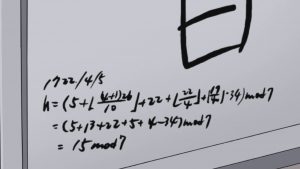 There’s a particular sort of frustration to watching shows like Nana Maru San Batsu. None of it comes from the series itself, which was excellent and thoroughly enjoyable. But there’s a level of chagrin which springs from the fact that you know you’re bing directed towards a dead end. I don’t think anyone in the production committee imagines a show like this will sell on disc, or that there’s a ghost of a chance for a second season – it’s not a series that panders, and the source material isn’t all that popular. No, adaptations like this are strictly advertisements for that source material – and they’re invariably one and done.
There’s a particular sort of frustration to watching shows like Nana Maru San Batsu. None of it comes from the series itself, which was excellent and thoroughly enjoyable. But there’s a level of chagrin which springs from the fact that you know you’re bing directed towards a dead end. I don’t think anyone in the production committee imagines a show like this will sell on disc, or that there’s a ghost of a chance for a second season – it’s not a series that panders, and the source material isn’t all that popular. No, adaptations like this are strictly advertisements for that source material – and they’re invariably one and done.
 The parallels between this series and Kabukibu! can hardly be overstated (and I’m not just saying that because I pegged it going into the season). They’re both positive, good-hearted coming-of-age stories that loosely follow the sports series structure, both helmed by excellent veteran directors at workmanlike studios that make up for modest budgets with strong content and tasteful production work. Both series were almost totally ignored by Western audiences, and both ended up being among the best series of the season (despite scoring poor numbers on fan review sites). And both – because of genre and general obscurity – seem unlikely to either be licensed or translated into English by other means (note: turns out there is actually an ongoing “unofficial” translation of the manga – my mistake). Once they’re done, they’re done.
The parallels between this series and Kabukibu! can hardly be overstated (and I’m not just saying that because I pegged it going into the season). They’re both positive, good-hearted coming-of-age stories that loosely follow the sports series structure, both helmed by excellent veteran directors at workmanlike studios that make up for modest budgets with strong content and tasteful production work. Both series were almost totally ignored by Western audiences, and both ended up being among the best series of the season (despite scoring poor numbers on fan review sites). And both – because of genre and general obscurity – seem unlikely to either be licensed or translated into English by other means (note: turns out there is actually an ongoing “unofficial” translation of the manga – my mistake). Once they’re done, they’re done.
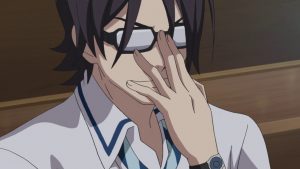 It can’t be helped. Do I regret it, coming to love shows like Nana Maru San Batsu? No, because the experience is so worthwhile in its own right. Make no mistake, this was a terrific series. It handled its subject matter of competitive quiz bowl about as well as any sports series has handled its theme, I would say – the detail work is really top-notch, and the actual competitions are genuinely exciting to a degree which one might not expect. And as a coming of age tale for Shiki, it’s equally stellar – not too many series have captured the experience of finding your passion and seeing a new world open up for you as adroitly as 7O3X.
It can’t be helped. Do I regret it, coming to love shows like Nana Maru San Batsu? No, because the experience is so worthwhile in its own right. Make no mistake, this was a terrific series. It handled its subject matter of competitive quiz bowl about as well as any sports series has handled its theme, I would say – the detail work is really top-notch, and the actual competitions are genuinely exciting to a degree which one might not expect. And as a coming of age tale for Shiki, it’s equally stellar – not too many series have captured the experience of finding your passion and seeing a new world open up for you as adroitly as 7O3X.
 This finale pretty much lays out all the ways in which Nana Maru San Batsu excels, starting with the cliffhanger question from last week. There are three boys on that stage who really matter to the story – and Shiki, Mikuriya and Akira each answer correctly(ish) in a manner totally befitting their personality. Mikuriya uses Zeller’s congruence to determine the right day of the week (Sunday). Shiki (how adorable is it that he’s unconsciously copied Sasajima’s glasses-straightening affectation?) relies on his vast pool of knowledge and love of books. remembering the answer his curiosity led him to with the help of the Imperial Hotel and a wedding. And Akira? He cheats, basically – he really doesn’t know the answer, but he figures he can at least improve his odds by messily writing a Kanji that could be either Sunday (日) or Monday (月), and seeing which way Mikuriya and Shiki answer.
This finale pretty much lays out all the ways in which Nana Maru San Batsu excels, starting with the cliffhanger question from last week. There are three boys on that stage who really matter to the story – and Shiki, Mikuriya and Akira each answer correctly(ish) in a manner totally befitting their personality. Mikuriya uses Zeller’s congruence to determine the right day of the week (Sunday). Shiki (how adorable is it that he’s unconsciously copied Sasajima’s glasses-straightening affectation?) relies on his vast pool of knowledge and love of books. remembering the answer his curiosity led him to with the help of the Imperial Hotel and a wedding. And Akira? He cheats, basically – he really doesn’t know the answer, but he figures he can at least improve his odds by messily writing a Kanji that could be either Sunday (日) or Monday (月), and seeing which way Mikuriya and Shiki answer.
 Not to gush, but that’s great on so many levels – as a general treatise on human nature, and on the nature of the three principals. Akira has blasted through Nana Maru San Batsu like a baby bull in a china shop, but he’s added a great element of unpredictability and sheer entertainment. I can see Akira becoming a very messed-up person when he gets older – his sheer love of fucking with people really isn’t healthy – but he’s a fascinating puzzle. And doing what he’s done here causes him to quit the game (after deducting his three points from Mikuriya in order to help Shiki out), because it violates his personal code of behavior in a way he finds distasteful – it’s a cheat code. Akira-kun loves to use the rules to his advantage, but to flat out contradict them? That’s really not any fun.
Not to gush, but that’s great on so many levels – as a general treatise on human nature, and on the nature of the three principals. Akira has blasted through Nana Maru San Batsu like a baby bull in a china shop, but he’s added a great element of unpredictability and sheer entertainment. I can see Akira becoming a very messed-up person when he gets older – his sheer love of fucking with people really isn’t healthy – but he’s a fascinating puzzle. And doing what he’s done here causes him to quit the game (after deducting his three points from Mikuriya in order to help Shiki out), because it violates his personal code of behavior in a way he finds distasteful – it’s a cheat code. Akira-kun loves to use the rules to his advantage, but to flat out contradict them? That’s really not any fun.
 While hyper-earnest Niina goes to remonstrate with Sonohara minor, Sonohara major stays to finish out the round – now down to five players with Akira’s withdrawal. Shibata is the third-place runner, and his decision to deduct a point from Shiki after a correct answer elicits a “thank you” – a hint as to Shiki’s state of mind. But Shibata punts the next question, leaving it down to the fated rivals for the final question – another Christian-themed one befitting the setting. In a way it’s a real shame that Shiki’s answer of Via Dolorosa isn’t correct, because it was really an elegant and beautiful chain of reasoning that got him to it. But incorrect it was, leaving Mikuriya-kun and his correct answer to move on to the final round.
While hyper-earnest Niina goes to remonstrate with Sonohara minor, Sonohara major stays to finish out the round – now down to five players with Akira’s withdrawal. Shibata is the third-place runner, and his decision to deduct a point from Shiki after a correct answer elicits a “thank you” – a hint as to Shiki’s state of mind. But Shibata punts the next question, leaving it down to the fated rivals for the final question – another Christian-themed one befitting the setting. In a way it’s a real shame that Shiki’s answer of Via Dolorosa isn’t correct, because it was really an elegant and beautiful chain of reasoning that got him to it. But incorrect it was, leaving Mikuriya-kun and his correct answer to move on to the final round.
 This game of quiz bowl really is fascinating, because there are so many ways to succeed at it. Shiki-kun really is a beautiful mind, in his way – a storehouse of information (shaded with his emotional interpretation) that even someone like Mikuriya doesn’t have. Shiki is a tribute to the power of curiosity – that last question was a killer which only Mikuriya got right (one survivor just guessed “Amen”), but truthfully, Shiki was the only one who could have come up with the answer he did. It might have been a correct answer, but the question would simply have been too difficult. As a romantic I like Shiki’s way of attacking this sport best, but it’s no more valid than anyone else’s. That said, once he masters the intricacies of the game itself, I suspect he’s going to be a beast.
This game of quiz bowl really is fascinating, because there are so many ways to succeed at it. Shiki-kun really is a beautiful mind, in his way – a storehouse of information (shaded with his emotional interpretation) that even someone like Mikuriya doesn’t have. Shiki is a tribute to the power of curiosity – that last question was a killer which only Mikuriya got right (one survivor just guessed “Amen”), but truthfully, Shiki was the only one who could have come up with the answer he did. It might have been a correct answer, but the question would simply have been too difficult. As a romantic I like Shiki’s way of attacking this sport best, but it’s no more valid than anyone else’s. That said, once he masters the intricacies of the game itself, I suspect he’s going to be a beast.
 Of course we’ll never get to see that, just as we never got to see Kurosu become a professional kabuki director – by its nature, this final episode doesn’t have the opportunity to act as a true finale in that sense. But it still works as a closer – Gakuto naturally wins the Asagaoka event (Ookura is no match for him in the end), though we don’t see it happen. And Shiki has his moment with Mikuriya in the aftermath – the full glory of having something he’s passionate about and a rival to share it with stirring him to shounen eloquence. As for Akira, the tears he sheds are perhaps of frustration – perhaps at himself for feeling a certain connection to what he’s participated in, and a desire to be part of it again.
Of course we’ll never get to see that, just as we never got to see Kurosu become a professional kabuki director – by its nature, this final episode doesn’t have the opportunity to act as a true finale in that sense. But it still works as a closer – Gakuto naturally wins the Asagaoka event (Ookura is no match for him in the end), though we don’t see it happen. And Shiki has his moment with Mikuriya in the aftermath – the full glory of having something he’s passionate about and a rival to share it with stirring him to shounen eloquence. As for Akira, the tears he sheds are perhaps of frustration – perhaps at himself for feeling a certain connection to what he’s participated in, and a desire to be part of it again.
 As unsatisfying as this sort of anime experience is in some sense, I wholeheartedly hope to have it again because in its way, it’s an indication that the medium still has a creative pulse. There are always going to be great manga that just happen to be popular enough to inspire anime because it makes financial sense, but it’s the little shows like Nana Maru San Batsu – the ones that Quixotically exist for their own sake, seemingly – that are probably most at-risk as anime becomes more and more thematically homogenous and risk-averse. And also because this is a really superb series, and I just want to have to opportunity to share my time with more like it.
As unsatisfying as this sort of anime experience is in some sense, I wholeheartedly hope to have it again because in its way, it’s an indication that the medium still has a creative pulse. There are always going to be great manga that just happen to be popular enough to inspire anime because it makes financial sense, but it’s the little shows like Nana Maru San Batsu – the ones that Quixotically exist for their own sake, seemingly – that are probably most at-risk as anime becomes more and more thematically homogenous and risk-averse. And also because this is a really superb series, and I just want to have to opportunity to share my time with more like it.
ED Sequence:
Epilogue:


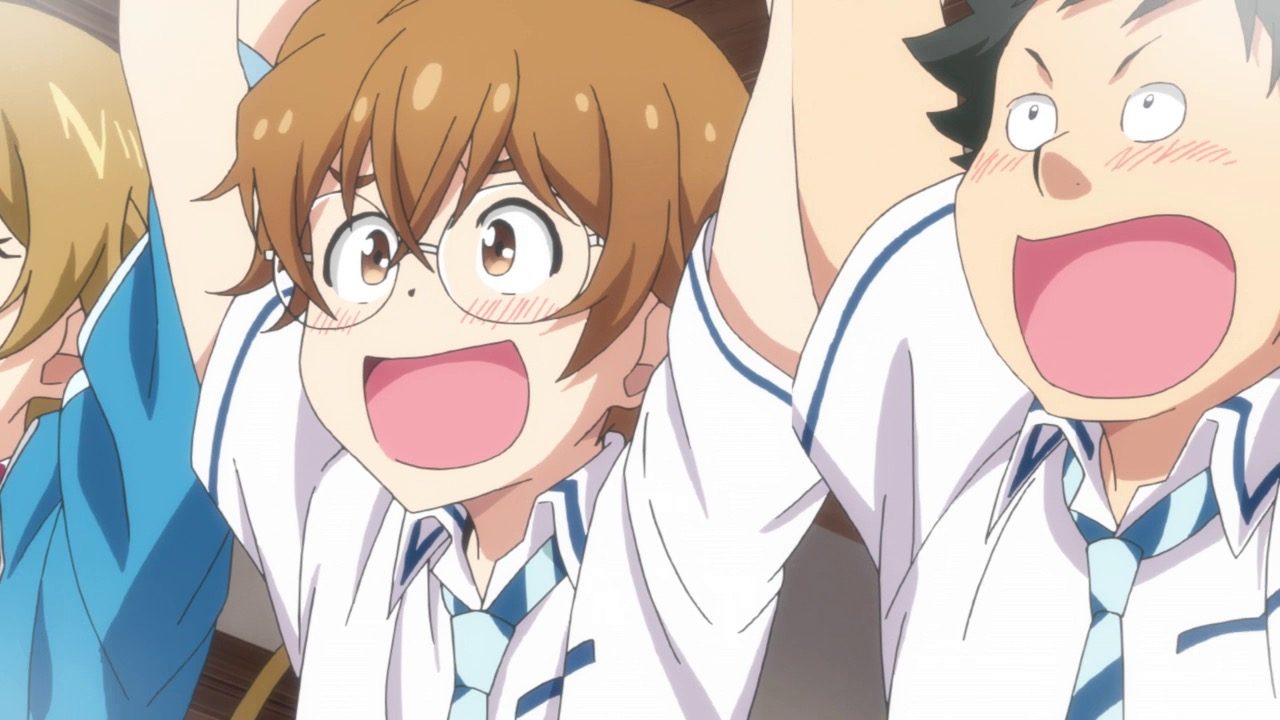
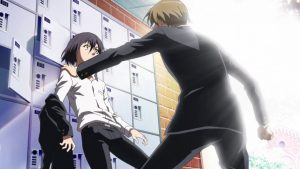


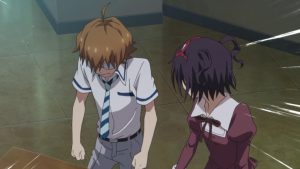

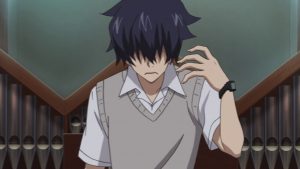













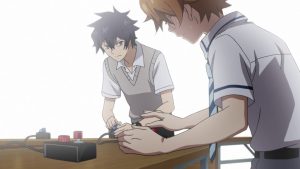


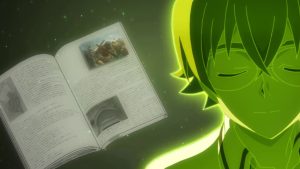
















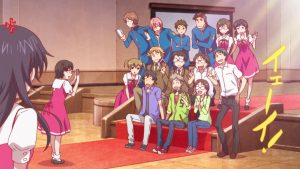












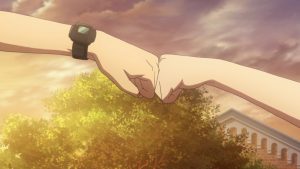



Ayran
September 20, 2017 at 12:24 amHi Enzo,
Thank you very much for the brilliant review. I am so glad to be able to share passion towards this show with you and other people who watch it.
The episode was wonderful. Baby bird Shiki’s copying of Sasajima is so adorable, yes:)) and his thank you, when Shibata deducts a point from him.
I was looking forward to exchange between Niina and Sonohara onee, but anime stuff had to cut it and put only one picture of it. Their conversation was really funny, and I was totally fangirling over their relationship.
Also, last two rounds of the quiz game were a lot of fun in the manga, very lively.
I am so happy that this anime was produced, it is a little gem among others.
Guardian Enzo
September 20, 2017 at 7:39 amMuch appreciated, thanks. I just wish someone would translate the manga – that would be a wonderful consolation prize.
Molly
October 7, 2017 at 8:18 amJust caught up on this show… Really wonderful little show. Thanks for your reviews as always, Enzo. You should catch up on the manga because unlike the anime, this arc still has some twists in for the reader.
Molly
October 7, 2017 at 8:21 amChapter 27-28 is the break off point for the anime.
Guardian Enzo
October 7, 2017 at 8:22 amThanks. I’m reading it, but the translations are not too fast so I want to make the 10 or so new chapters last as long as possible..